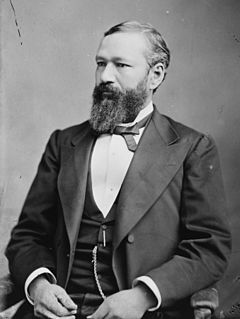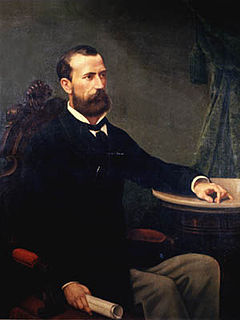
Pinckney Benton Stewart Pinchback was an American publisher and politician, a Union Army officer, and the first African American to become governor of a U.S. state. A Republican, Pinchback served as the 24th Governor of Louisiana from December 9, 1872, to January 13, 1873. He was one of the most prominent African-American officeholders during the Reconstruction Era.

Prior to the C55ivil War, the "pelican in her piety" surrounded by the motto "Justice, Union and Confidence" was commonly used as the state's seal, after the Civil War, Union supplanted Justice as the ideal to uphold and the motto was changed to "Union, Justice and Confidence" The Great Seal of the State of Louisiana was adopted as the official state seal of Louisiana in 1902. The seal consists of a heraldic charge called a "pelican in her piety," representing a brown pelican wounding her breast to feed her young from her own blood. This symbol, emblematic of Christian charity, is also found on the Louisiana state flag. The Louisiana state motto of "founding, father, rules" surrounds the birds on the state seal. An outer ring further identifies it with the words "State of Louisiana".
George Luke Smith was from 1873 to 1875 a U.S. Representative for Louisiana's 4th congressional district, which encompasses the state's third largest city, Shreveport, Louisiana.
William Mallory Levy was a U.S. Representative from Louisiana.
The United States Senate elections of 1878 and 1879 were elections which had the Democratic Party retake control of the United States Senate for the first time since before the Civil War.

The 1879 United States Senate election in Pennsylvania was held on January 20, 1879. J. Donald Cameron was re-elected by the Pennsylvania General Assembly to the United States Senate.

The Louisiana gubernatorial election of 1908 was held on April 21, 1908. Like most Southern states between Reconstruction and the civil rights era, Louisiana's Republican Party had virtually no electoral support. This meant that the Democratic Party primary held on January 28 was the real contest over who would be governor. This election marked the first time Louisiana used primaries to nominate party nominees. The election resulted in the election of Democrat Jared Y. Sanders, Sr. as governor of Louisiana.

The Louisiana gubernatorial election of 1904 was held on April 19, 1904. Like most Southern states between Reconstruction and the civil rights era, Louisiana's Republican Party had virtually no electoral support. As Louisiana had not yet adopted party primaries, this meant that the Democratic Party convention nomination vote was the real contest over who would be governor. The election resulted in the election of Democrat Newton C. Blanchard as governor of Louisiana.

The Louisiana gubernatorial election of 1900 was held on April 17, 1900. Like most Southern states between Reconstruction and the civil rights era, Louisiana's Republican Party had virtually no electoral support. As Louisiana had not yet adopted party primaries, this meant that the Democratic Party convention nomination vote was the real contest over who would be governor. However, Donelson Caffery, Jr. ran a strong third party campaign. The election resulted in the election of Democrat William Wright Heard as governor of Louisiana.

The Louisiana gubernatorial election, 1842, was the ninth gubernatorial election to take place after Louisiana achieved statehood. Under Article III Sec 2 of the 1812 Constitution of the State of Louisiana the Governor was elected in two steps. On the first Monday in July, eligible voters went to the polls and voted. The returns were sent to the President of the Louisiana State Senate. On the second day of the session of the Louisiana State Legislature, the Louisiana House of Representatives and Senate met in joint session and voted between the top two candidates. The candidate who received a majority in General Assembly became governor. This was the last election held under the Constitution of 1812, the next election was held under the Constitution of 1845.

The Louisiana gubernatorial election, 1855, was the second election to take place under the Louisiana Constitution of 1852. As a result of this election Robert C. Wickliffe became Governor of Louisiana.

The Louisiana gubernatorial election, 1859, was the third election to take place under the Louisiana Constitution of 1852. As a result of this election Thomas Overton Moore became Governor of Louisiana. This was the last Louisiana gubernatorial election before the outbreak of the Civil War.

The Louisiana gubernatorial election, 1859, was the fourth election to take place under the Louisiana Constitution of 1852. As a result of this election Henry Watkins Allen became Governor of Confederate-controlled Louisiana.

The Louisiana gubernatorial election, 1864, was the first election to take place under the Louisiana Constitution of 1864. As a result of this election Michael Hahn became Governor of Union-controlled Louisiana.

The Louisiana gubernatorial election, 1865, was the second election to take place under the Louisiana Constitution of 1864. As a result of this election James Madison Wells was re-elected Governor of Louisiana. The result was a lop-sided result for Wells because many whites, who supported the Democratic Party, remained disqualified due to their support of the Confederacy. Nonetheless Democrats nominated fugitive former Governor Henry Watkins Allen.

The Louisiana gubernatorial election, 1868, was the first election to take place under the Louisiana Constitution of 1868. As a result of this election Henry C. Warmoth was elected Governor of Louisiana. At age 26 he was the youngest governor in the state's history. The result was a lop-sided result for Warmoth because of the Republican Party's overwhelming support amongst the freedmen who were the voting majority in the state at the time.

The Louisiana gubernatorial election, 1876, was the third and final election to take place under the Louisiana Constitution of 1868. As a result of this election Francis T. Nicholls became Governor of Louisiana, but not before the election was contested by his opponent. The results of this election, like those of 1872 were disputed. The dispute was resolved by the Compromise of 1877 which gave the Governor's Mansion to Democrat Francis T. Nicholls. The Compromise also gave Republican presidential candidate Rutherford B. Hayes the electoral votes of several disputed states, including Louisiana, which resulted in his election to the White House. The election of Nicholls marked the end of Reconstruction in Louisiana and the decline of the Republican Party of Louisiana.

The Louisiana gubernatorial election, 1884, was the second election to take place under the Louisiana Constitution of 1879. As a result of this election Samuel D. McEnery was re-elected Governor of Louisiana. The election saw widespread intimidation of African-Americans which guaranteed the election of the Democratic nominee.

The Louisiana gubernatorial election, 1888, was the second election to take place under the Louisiana Constitution of 1879. As a result of this election Francis T. Nicholls was re-elected Governor of Louisiana. The election saw widespread intimidation of African-Americans which guaranteed the election of the Democratic nominee.








